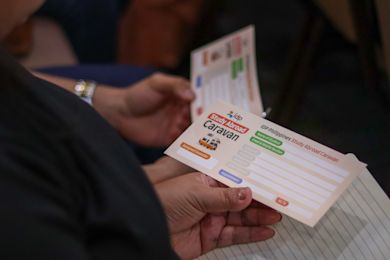- News and articles
- Events
- Find usIDP AustraliaIDP BahrainIDP BangladeshIDP CambodiaIDP CanadaIDP ChinaIDP EgyptIDP GhanaIDP Hong KongIDP IndiaIDP IndonesiaIDP IranIDP JordanIDP KenyaIDP KoreaIDP KuwaitIDP LebanonIDP MalaysiaIDP MauritiusIDP Middle EastIDP NepalIDP New ZealandIDP NigeriaIDP OmanIDP PakistanIDP Saudi ArabiaIDP SingaporeIDP Sri LankaIDP Taiwan, ChinaIDP ThailandIDP TurkeyIDP UAEIDP VietnamIDP Corporate
- Social
- English
Topics covered
- Published: 12 April 2024
If you’re looking to get certified to be a nurse and migrate to your preferred country, you’re probably aware that you will be required to prove your English language skills in order to communicate with your staff and patients to provide medical care.
This can be done by taking an English proficiency test such as the International English Language Testing System (IELTS) or the Occupational English Test (OET).
Before making a decision, take a closer look at what each test covers as well as some key differences between the two.
What is IELTS?
Set as the golden standard for English proficiency tests, the IELTS test was launched in 1989 and evaluates the fluency of English in both written and spoken formats.
Accepted by over 12,000 organizations in more than 150 countries, IELTS has paper-based, computer-based, and online versions of its test, which is split into four sections: speaking, writing, listening and reading.
What is OET?
Designed to cater to 12 professions in the healthcare industry including nurses, dentists, optometrists and physiotherapists, the OET is an English language test which assesses the language communication skills of healthcare professionals.
Initially intended to be accepted only in Australia and New Zealand, OET test results are now accepted by the UK’s Nursing and Midwifery Council (NMC), Ireland's Nursing and Midwifery Board (NMBI), and America's Commission on Graduates of Foreign Nursing Schools (CGFNS) since 2017.
5 Things to Consider Before You Select IELTS or OET
1. IELTS Has a Wider Range of Content
The OET is a popular option among healthcare professionals because it uses profession-specific content, making it highly relevant to those who need to be able to communicate in medical scenarios – from understanding a patient in a consultation session to writing a discharge or referral letter.
While it is good to be fluent in medical English, it could be helpful to gain a better understanding of English as a whole – which is what IELTS helps you to achieve.
Used by international students and professionals across industries, IELTS covers a wider range of topics and content including social trends, the environment, education and cultural values.
Having the ability to discuss such topics, write essays and understand articles could potentially offer you more job flexibility while enabling you to be better at communicating.
2. IELTS Offers Two Versions vs OET's Versions for 12 Professions
There are two versions of the IELTS test: Academic and General Training, which are used by organizations to assess language skills for vocational or immigration purposes.
While the listening and speaking portions of the test are the same for both IELTS tests, the Academic test’s reading and writing components are more tailored to higher education compared with the General Training.
On the other hand, the OET offers 12 versions of the test for the different healthcare professions. For these tests, the reading and listening sections are the same. However, the speaking and writing portions are geared towards specific scenarios in which each profession has to communicate in English.
3. IELTS Has a Shorter Test Format Than the OET
While both the IELTS and OET tests assess the same four language skills, IELTS has a shorter test format.
Listening
For the listening section, IELTS requires you to listen to four recordings and answer questions based on them.
Meanwhile, the OET has three parts that span over a longer period of time.
Part A involves completing notes while listening to two patient consultation extracts. Parts B and C are multiple-choice questions about typical workplace colleague communication and presentations on the topic of healthcare, respectively.
Reading
The IELTS Reading portion involves answering questions and completing tasks based on three long passages of text from newspapers or journals.
As for the OET, its reading component has three parts. Part A test candidates' ability to quickly locate and record information from short texts containing treatment information. Parts B and C are multiple-choice questions typical workplace texts and healthcare articles, respectively.
Writing
For the IELTS Writing section, you’ll have two tasks – to first study and write about some data or graphs provided, after which you’ll be required to write an essay based on a selected subject.
When sitting for the OET writing component, you’ll be required to read case notes about a patient you have been treating and write a letter requesting further care based on the case notes.
Speaking
During the IELTS Speaking section, you’ll be discussing general topics such as your hobbies and interests, and for the later part, you’ll speak about a topic assigned to you on a task card.
For the OET speaking component, you'll complete two role plays using cards outlining the patient's healthcare situation. You'll assume the role of the nurse while an interlocutor takes the role of your patient or a relative of the patient.
4. IELTS Has World Recognition Compared With OET
IELTS is recognized by 12,000 organizations globally, including government organizations, regulatory bodies and higher education institutions for education, career, and migration purposes. IELTS is available in more than 4000 test locations in over 140 countries including Australia, New Zealand, Canada, the UK and the USA.
The OET is recognized by healthcare regulatory bodies and higher education healthcare educators including Ireland, the UK, Dubai, Australia, New Zealand, Canada, and the USA with over 580 test centers in 80 countries.
5. IELTS Has a Lower Cost and More Availability
As more places offer IELTS, there are more available test dates. Hence, it is easier to book a test date at your convenience.
Apart from that, IELTS is much cheaper than the OET.
Get Ready for Your IELTS Test With IDP
Are you thinking of taking your IELTS test en route to becoming a certified nurse?
At IDP, we have decades of experience in helping students to prepare for their IELTS test and we can help you too.
With a wealth of resources available to help you effectively prepare for your IELTS test, we’ll definitely be able to give you an extra push towards getting a good score.
Take your IELTS test with us today!
One account for all your study abroad needs
Create your profile and unlock a wide array of features including personalised recommendations, fast-tracked applications and much more.

Book your IELTS test
Watch the story of lifelong dreams, passion and determination that truly reflects the journey of our IELTS test takers. IELTS is the breakthrough to a world of full of incredible.
Search for articles
Dive into our extensive collection of articles by using our comprehensive topic search tool.















